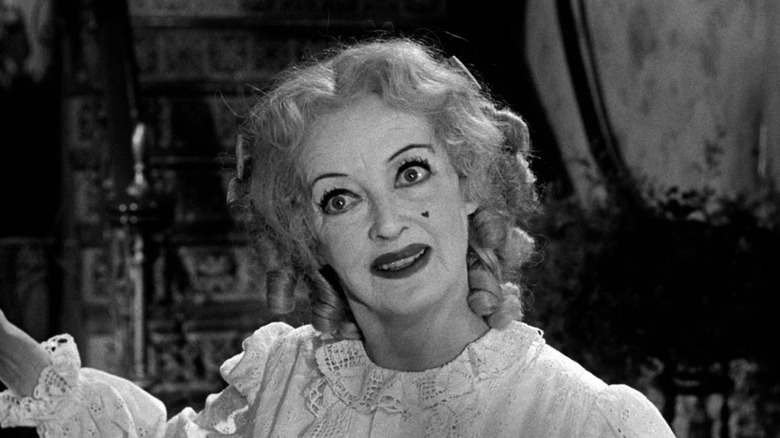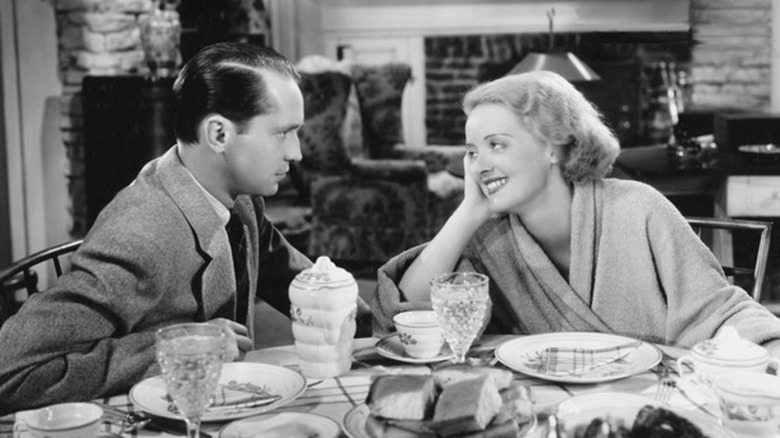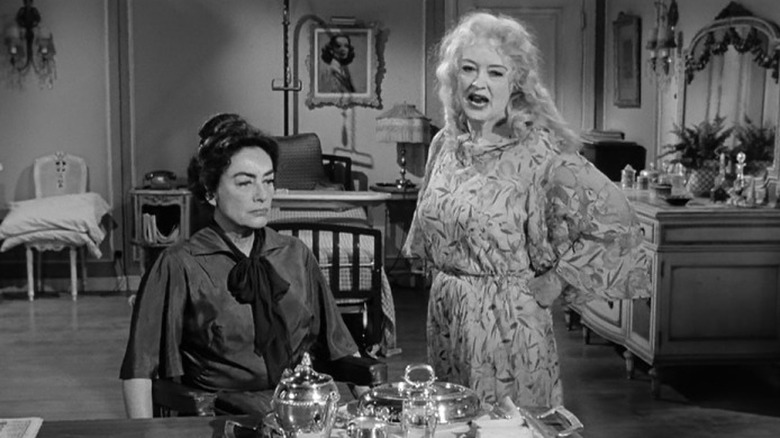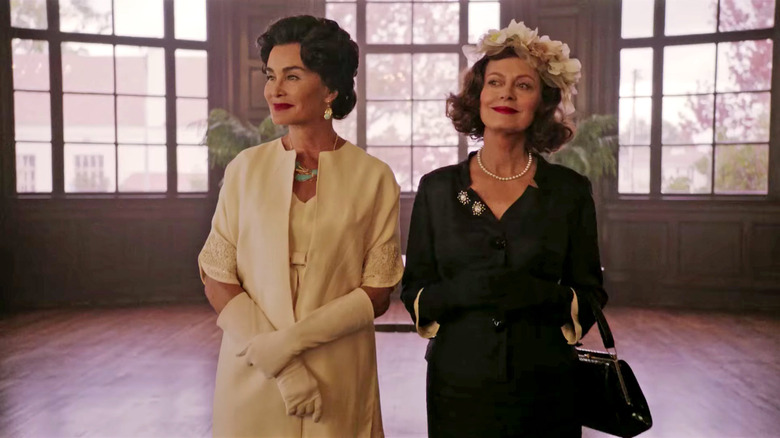Bette Davis Claims Joan Crawford Cost Her The Oscar For Her Role As Baby Jane
Sometimes, the antagonism you see between two characters in a movie isn't acting. Bette Davis and Joan Crawford in "What Ever Happened to Baby Jane" is one of the most infamous examples thereof; their feud has inspired books, podcasts, and even a mini-series.
In the film (directed by Robert Aldrich), they play the Hudson sisters, Jane (Davis) and Blanche (Crawford). The limelight has moved past them both; Jane was a child star whose talents didn't last to adulthood while Blanche had a film career before being paralyzed in a car crash. Jane has to dote on the incapacitated Blanche, only furthering the resentment. There's a clear meta-textual undercurrent; Davis and Crawford were not considered "bankable" as women in their fifties, and there's no industry as hostile to middle-aged women as Hollywood.
Davis/Crawford's infighting began before the film even started production. According to Davis, Crawford initially suggested she play Jane and Davis play Blanche, but Davis insisted that she play Jane.
From there, some of the catfighting was just harmless and petty. For instance, Crawford sat on the board of Pepsi at the time, having inherited a seat from her late husband Alfred Steele. So, Davis had a Coke machine installed on-set. Other times, it was more serious; for a scene where Jane knocks out Blanche, Davis reportedly hit Crawford so hard the latter required stitches. Likewise, in a scene where Jane has to lift Blanche, Crawford filled her dress with extra weight to aggravate Davis' bad back.
Once the camera stopped rolling, the feud continued, all the way up to Oscar time. While Davis was nominated for Best Actress for playing Jane, Crawford got no such nod for Blanche. So, according to Davis, Crawford plotted to vengefully upstage her.
Evolution of a feud
Crawford began acting in 1924, while Davis' screen debut came in 1929; their mutual dislike stretched almost as long as their careers. The first slight is believed to go back to 1933. That year, Davis' starring role in "Ex-Lady" was upstaged by news of Crawford's divorce from Douglas Fairbanks Jr. Two years later, Crawford married Franchot Tone. Davis had fallen for Tone when working with him on "Dangerous" and was understandably upset.
According to Crawford's biography "Not the Girl Next Door," "Franchot thought Bette was a good actress, but he never thought of her as a woman. Plus, while Tone wasn't interested in Davis, the bisexual Crawford "wouldn't mind giving her a poke." Davis probably would have considered that insult added to injury.
After this series of slights, Davis never stopped looking at Crawford with green eyes. Time didn't heal this wound either, not even once Crawford passed. Davis told the Daily Mail in 1987, "She took [Tone] from me. She did it coldly, deliberately, and with complete ruthlessness. I have never forgiven her for that and never will."
It wasn't all lovers' quarrels that fueled this rivalry, though — it was also the Oscars. In 1936, Davis won her first Best Actress award for "Dangerous." Crawford spit on the mood by sniping at Davis's outfit, "Dear Bette, what a lovely frock." A decade later, Crawford won her own Oscar for playing the lead in "Mildred Pierce" — a role that Davis had turned down.
Davis had previously said she and Crawford would star together in a film "when Hell freezes over." Satan must have had a chilly winter in 1962, because the two finally starred together in "What Ever Happened To Baby Jane." This wound up creating the denouement for their Oscar feud.
Feuding at the Oscars
At the 35th Academy Awards, Davis lost Best Actress to Anne Bancroft, who had been nominated for "The Miracle Worker." Speaking with Bryant Gumbel in 1987, Davis alleged that Crawford told the nominees who couldn't attend the ceremony that she'd accept the award for them — so long as they didn't vote Bette Davis for Best Actress. So when the absent Bancroft was announced as the Best Actress winner, Davis got to watch Crawford walk away with the award she'd been denied, and which Crawford hadn't even been nominated for. Ouch.
In the aforementioned interview, Davis threw it back at Crawford, making it sound like she'd cut off her nose to spite her face. Davis explained, "If I had won that Oscar, we'd have made a million more dollars on the film; that's what always happens. So, she wasn't very smart about what she did."
When looking at the timeline of this feud, it can seem like Crawford often got the best of Davis. However, Davis outlived Crawford by more than a decade, and really, there's no better last laugh than that. What, you may ask, was Davis's reaction when she learned of her old rival's death? "You should never say bad things about the dead, only good ... Joan Crawford is dead. Good."
'All this time, we could have been friends'
"Feud" is a 2017 FX mini-series chronicling Crawford and Davis' rivalry; the bulk of it follows the "Baby Jane" shoot. Jessica Lange plays Joan and Susan Sarandon plays Bette. Series creator Ryan Murphy has never come across a piece of history he couldn't exploit. However, this time he had more of a personal connection; while working as a journalist in 1989, he got to interview Davis weeks before her death. That encounter shaped the series.
Murphy recalled to Vanity Fair:
"In the interview that I had with her, Bette Davis actually expressed some regret about how she and Joan ended up, which was fascinating to me. I have always had a wistful dream that Bette and Joan could have watched this together. I think that my favorite line from 'What Ever Happened to Baby Jane?' is at the end of the film, when Jane tells Blanche, just as she is dying, 'You mean all this time we could have been friends?' To me, that's what the whole show is about."
Sarandon also spoke about the feud with a forlorn attitude, though for different reasons. She feels that the feud was stoked by studio bosses such as Jack Warner; there's no better publicity for a movie than gossip. Sarandon elaborated:
"In Bette's time, the [Hollywood power brokers] really knew how to pit these women against each other, so that they had more control over them. They couldn't afford for women like Bette and Joan to join forces."
Despite this, "Feud" doesn't go so far as to change history's outcome (Davis' bitter eulogy for Crawford is featured, for instance). The only thing that might have done that would've been an Oscar-shaped olive branch from Joan Crawford to Bette Davis.



